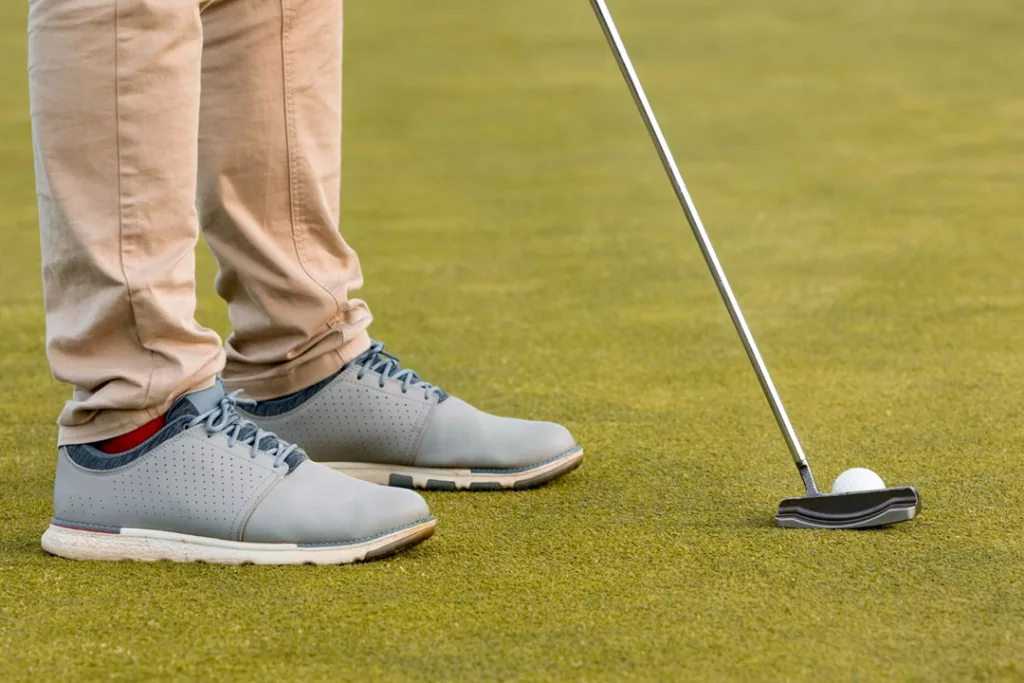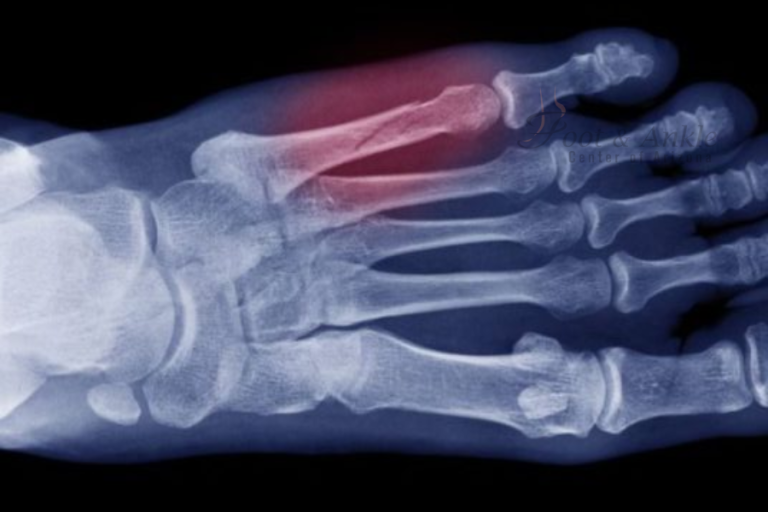Even though golf doesn’t involve vigorous running or jumping, it’s important to be aware of potential foot and ankle injuries. The repetitive motion of swinging, walking long distances, and uneven terrain can place significant stress on the feet and ankles, leading to various conditions. Golfers should keep the following risks in mind to avoid a Golfer Injury:
Common Golf-Related Foot and Ankle Injuries
Heel Pain (Plantar Fasciitis)
Walking for extended periods on the golf course, especially on uneven terrain, can exacerbate plantar fasciitis, a condition caused by inflammation of the plantar fascia, the thick band of tissue running along the bottom of the foot. This leads to heel pain, particularly in the morning or after long periods of rest.
Metatarsalgia
The ball of the foot endures stress during the golf swing as it helps pivot the body. Excessive force in this area can lead to metatarsalgia, which causes pain and inflammation in the forefoot and can contribute to a Golfer Injury.
Capsulitis of the Second Toe
Repetitive motion during a golf swing can strain the ligaments surrounding the toe joints, leading to capsulitis, an inflammation of the joint capsule in the second toe, causing discomfort and swelling.
Neuromas (Morton’s Neuroma)
Golfers who wear tight or narrow shoes may develop Morton’s neuroma, a thickening of the tissue around the nerves leading to the toes. This condition results in a burning sensation, tingling, or pain in the forefoot, contributing to a Golfer Injury.
Big Toe Joint Pain (Hallux Rigidus)
The repeated motion of shifting weight onto the front foot during a swing can cause pain in the big toe joint. Hallux rigidus, a form of arthritis, can develop, making it difficult to bend the toe.
Sesamoiditis
The sesamoid bones, located beneath the big toe joint, can become inflamed due to repeated stress from walking and swinging, leading to pain and tenderness under the big toe.
Ankle Sprains
Golf courses often have uneven terrain, which increases the risk of rolling the ankle and causing a sprain. Poor foot stability can also contribute to this issue, increasing the chances of a Golfer Injury.
Tendonitis
The Achilles tendon and other tendons in the foot can become inflamed due to overuse, leading to pain and stiffness, especially after long rounds of golf.
Prevention Tips for Golfers
- Choose Proper Footwear: Wear supportive golf shoes with adequate arch support and cushioning to reduce foot stress and minimize the risk of a Golfer Injury.
- Warm-Up and Stretch: Stretching the calves, ankles, and feet before playing can help prevent injuries.
- Use Orthotics: Custom or over-the-counter insoles can provide extra support and help distribute pressure evenly.
- Modify Your Swing: Ensuring proper posture and swing mechanics can reduce strain on the feet and ankles.
- Stay Hydrated and Take Breaks: Fatigue can lead to poor form, increasing the risk of injury.
Treatment Options
If you experience foot or ankle pain from golf, consider the following treatments:
- Rest and Ice: Reduce activity and apply ice to the affected area to decrease inflammation.
- Stretching and Strengthening Exercises: Regular stretching and foot-strengthening exercises can aid recovery.
- Anti-Inflammatory Medications: Over-the-counter medications can help manage pain and swelling.
- Visit a Specialist: If pain persists, consult a foot and ankle specialist to assess the condition and recommend treatment options such as physical therapy, orthotics, or medical interventions.
Conclusion
While golf is a low-impact sport, it still poses risks for foot and ankle injuries. By taking preventive measures, wearing proper footwear, and being mindful of early symptoms, golfers can enjoy the game pain-free. If you experience persistent foot pain, consult a specialist for a comprehensive evaluation and personalized treatment plan. Being proactive about preventing Golfer Injury will help ensure a longer, pain-free golfing experience.




